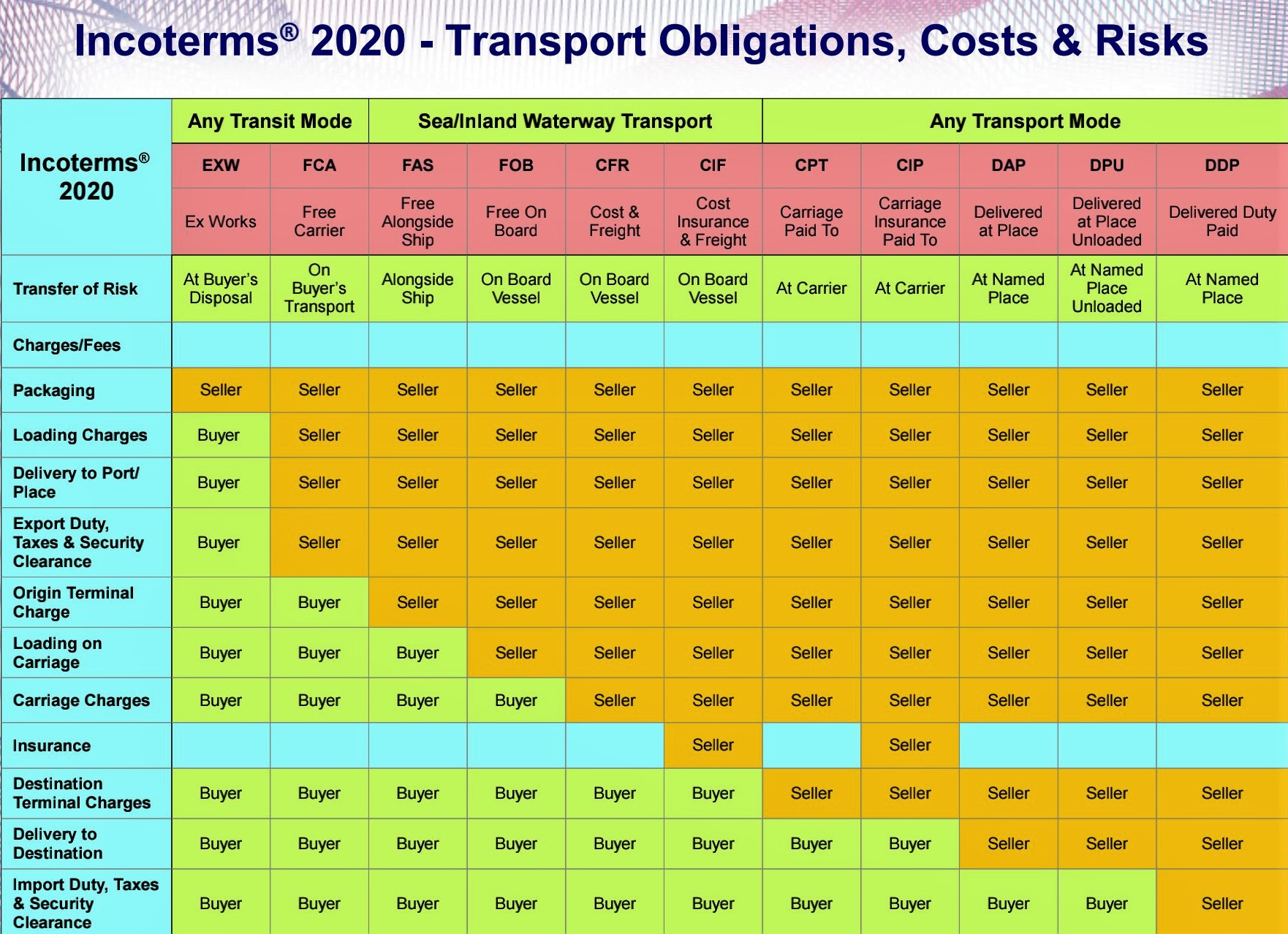
➢ What are Incoterms rules? The Incoterms rules are the world’s essential terms of trade for the sale of goods. Whether you are filing a purchase order, packaging and labeling a shipment for freight transport or preparing a certificate of origin at a port, they are there to guide you. They provide specific guidance to individuals participating in the import and export of global trade daily.
➢ Why use Incoterms rules in international trade? Although other clauses for global trade exist around the world, such as the Harmonised Tariff Schedule of the United States, Incoterms rules are global in their reach. Similarly, Incoterms rules do not include trade terms codified for national purposes, such as the “less than truckload shipping” (LTL) rule of the United States. Unlike national trade policies Incoterms rules are universal, providing clarity and predictability to business.

➢ What does “Incoterms” stand for? “Incoterms ” is an acronym standing for International Commercial Terms. The Incoterms rules feature abbreviations for terms, like FOB (“Free on Board”), DAP (“Delivered at Place”) EXW (“Ex Works”), CIP (“Carriage and Insurance Paid To”), which all have very precise meanings for the sale of goods around the world. These terms hold universal meaning for buyers and sellers around the world. If you are a financial analyst in the City of London, then you might associate the acronym “FCA” with the United Kingdom’s Financial Conduct Authority. However, for importers and exporters around the world, FCA is the initials used for “Free Carrier,” or the seller’s obligation to deliver the goods to the carrier nominated by the buyer at the seller’s premises or another named place. Historical evolution of Incoterms 1923: ICC’s first sounding of commercial trade terms After ICC’s creation in 1919, one of its first initiatives was to facilitate international trade. In the early 1920s the world business organization set out to understand the commercial trade terms used by merchants. This was done through a study that was limited to six commonly used terms in just 13 countries. The findings were published in 1923, highlighting disparities in interpretation. 1928: Clarity improved To examine the discrepancies identified in the initial survey, a second study was carried out. This time, the scope was expanded to the interpretation of trade terms used in more than 30 countries. 1936: Global guidelines for traders Based on the findings of the studies, the first version of the Incoterms rules was published. The terms included FAS, FOB, C&F, CIF, Ex Ship and Ex Quay. 1953: Rise of transportation by rail Due to World War II, supplementary revisions of the Incoterms rules were suspended and did not resume again until the 1950s. The first revision of the Incoterms rules was then issued in 1953. It debuted three new trade terms for non-maritime transport. The new rules comprised DCP (Delivered Costs Paid), FOR (Free on Rail) and FOT (Free on Truck). 1967: Misinterpretations corrected ICC launched the third revision of the Incoterms rules, which dealt with misinterpretations of the previous version. Two trade terms were added to address delivery at frontier (DAF) and delivery at destination (DDP). 1974: Advances in air travel The increased use of air transportation gave cause for another version of the popular trade terms. This edition included the new term FOB Airport (Free on Board Airport). This rule aimed to allay confusion around the term FOB (Free on Board) by signifying the exact “vessel” used. 1980: Proliferation of container traffic With the expansion of carriage of goods in containers and new documentation processes, came the need for another revision. This edition introduced the trade term FRC (Free Carrier…Named at Point), which provided for goods not received by the ship’s side but at a reception point on shore, such as a container yard. 1990: A complete revision The fifth revision simplified the Free Carrier term by deleting rules for specific modes of transport (i.e., FOR; Free on Rail, FOT; Free on Truck, and FOB Airport; Free on Board Airport). It was considered sufficient to use the general term FCA (Free Carrier…at Named Point) instead. Other provisions accounted for increased use of electronic messages. 2000: Amended customs clearance obligations The “License, Authorisations and Formalities” section of FAS and DEQ Incoterms rules were modified to comply with the way most customs authorities address the issues of exporter and importer of record. 2010: Reflections on the contemporary trade landscape Incoterms 2010 is the most current edition of the rules to date. This version consolidated the D-family of rules, removing DAF (Delivered at Frontier), DES (Delivered Ex Ship), DEQ (Delivered Ex Quay) and DDU (Delivered Duty Unpaid) and adding DAT (Delivered at Terminal) and DAP (Delivered at Place). Other modifications included an increased obligation for buyer and seller to cooperate on information sharing and changes to accommodate “string sales.”





